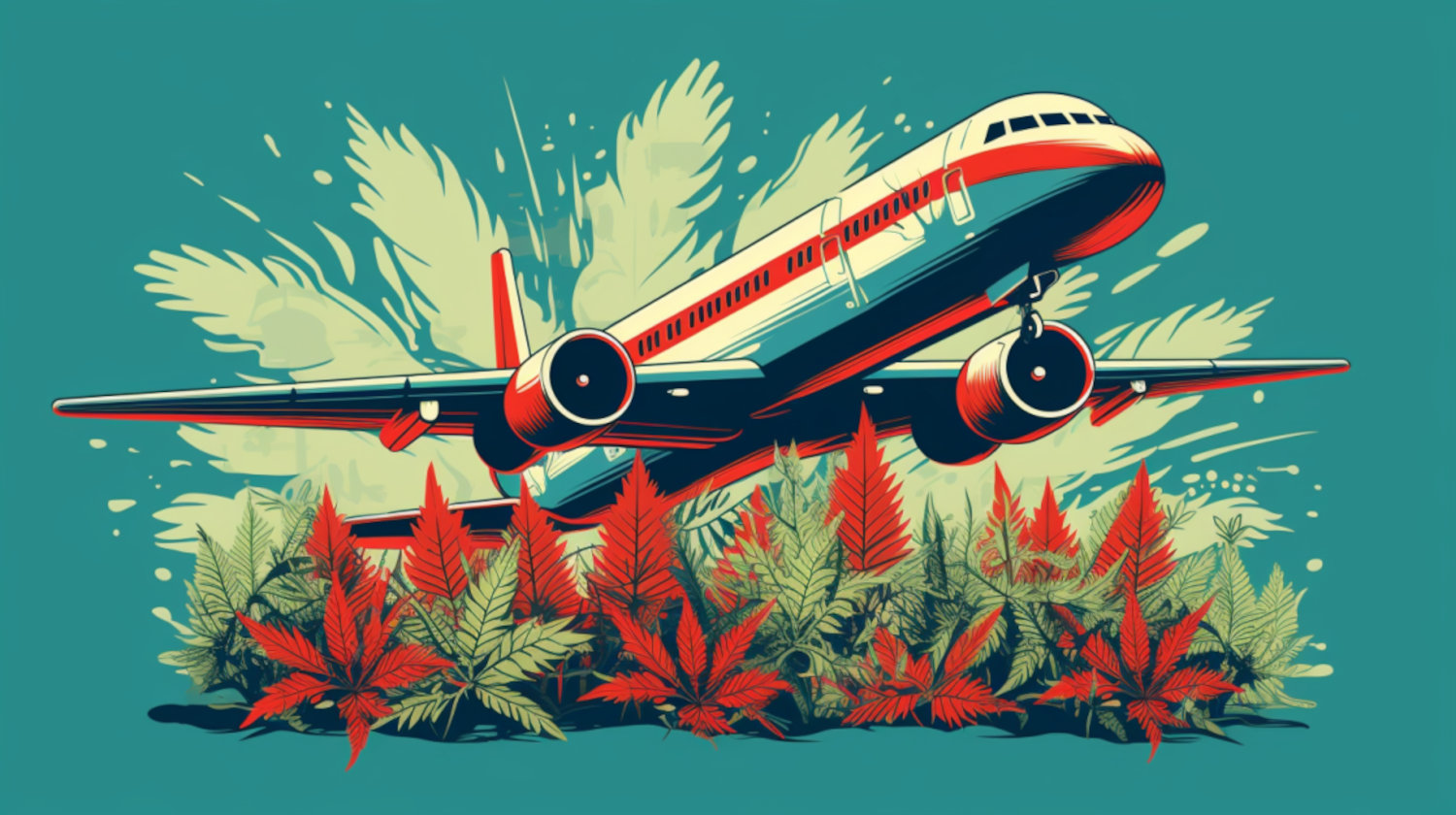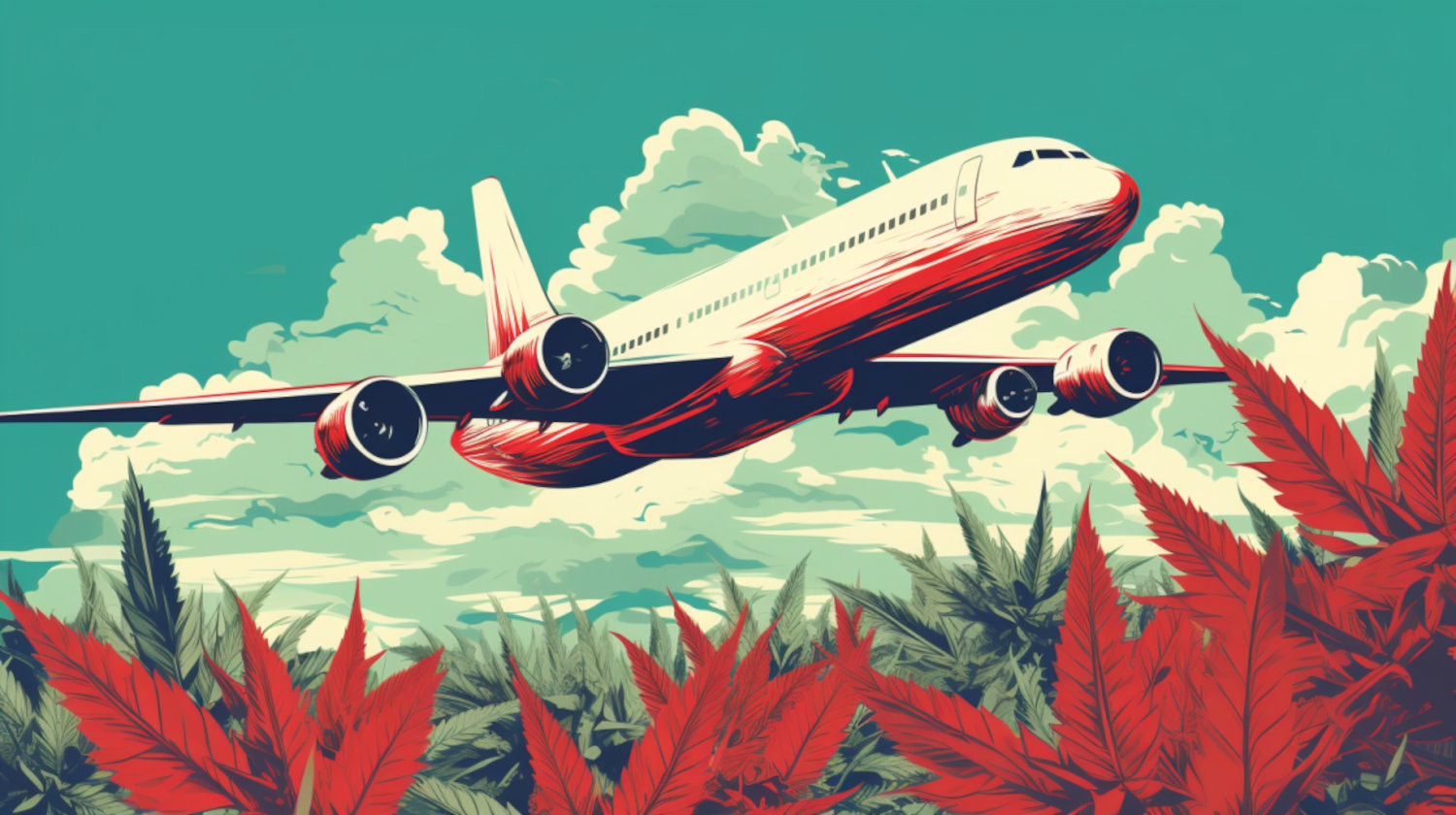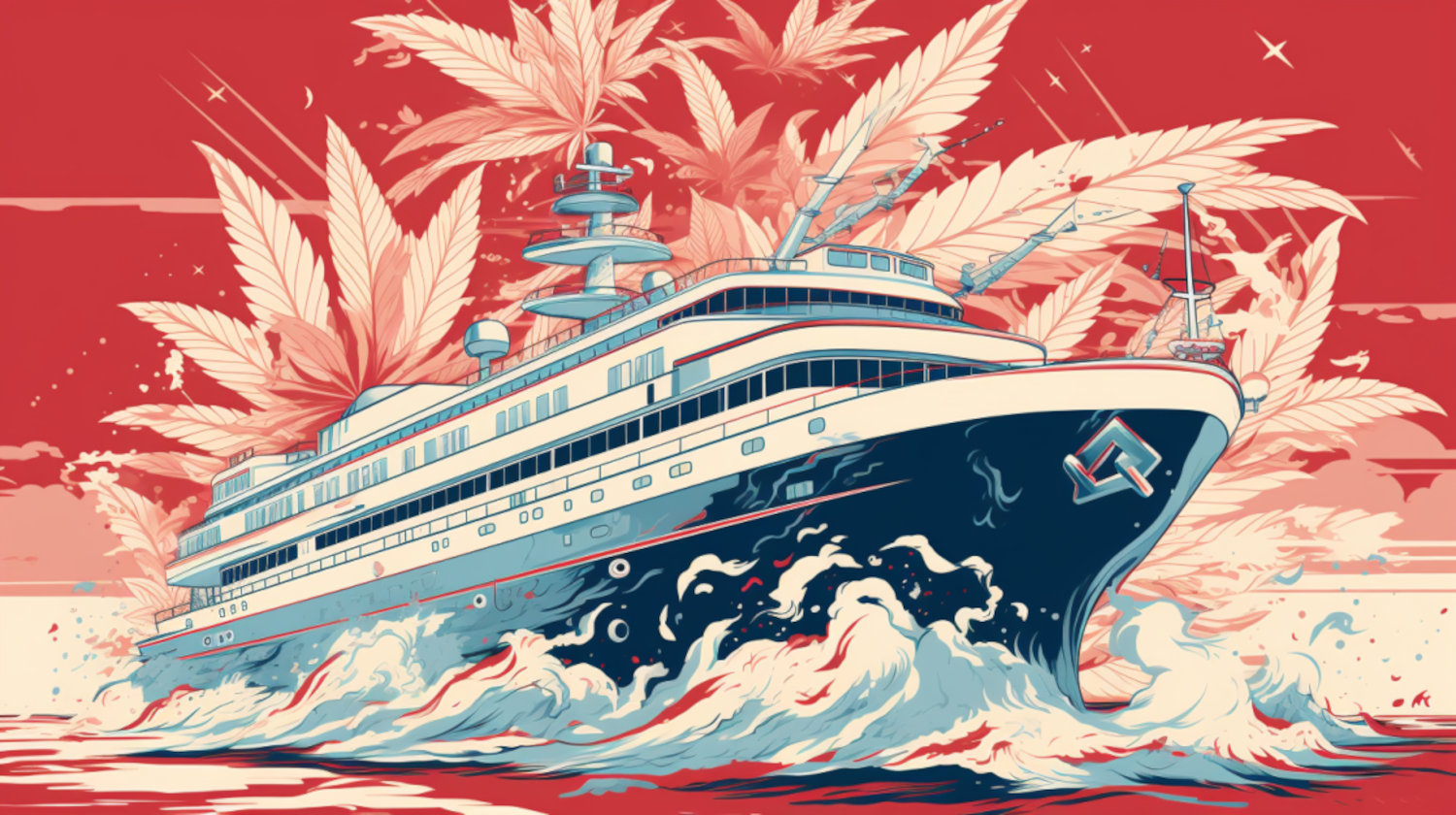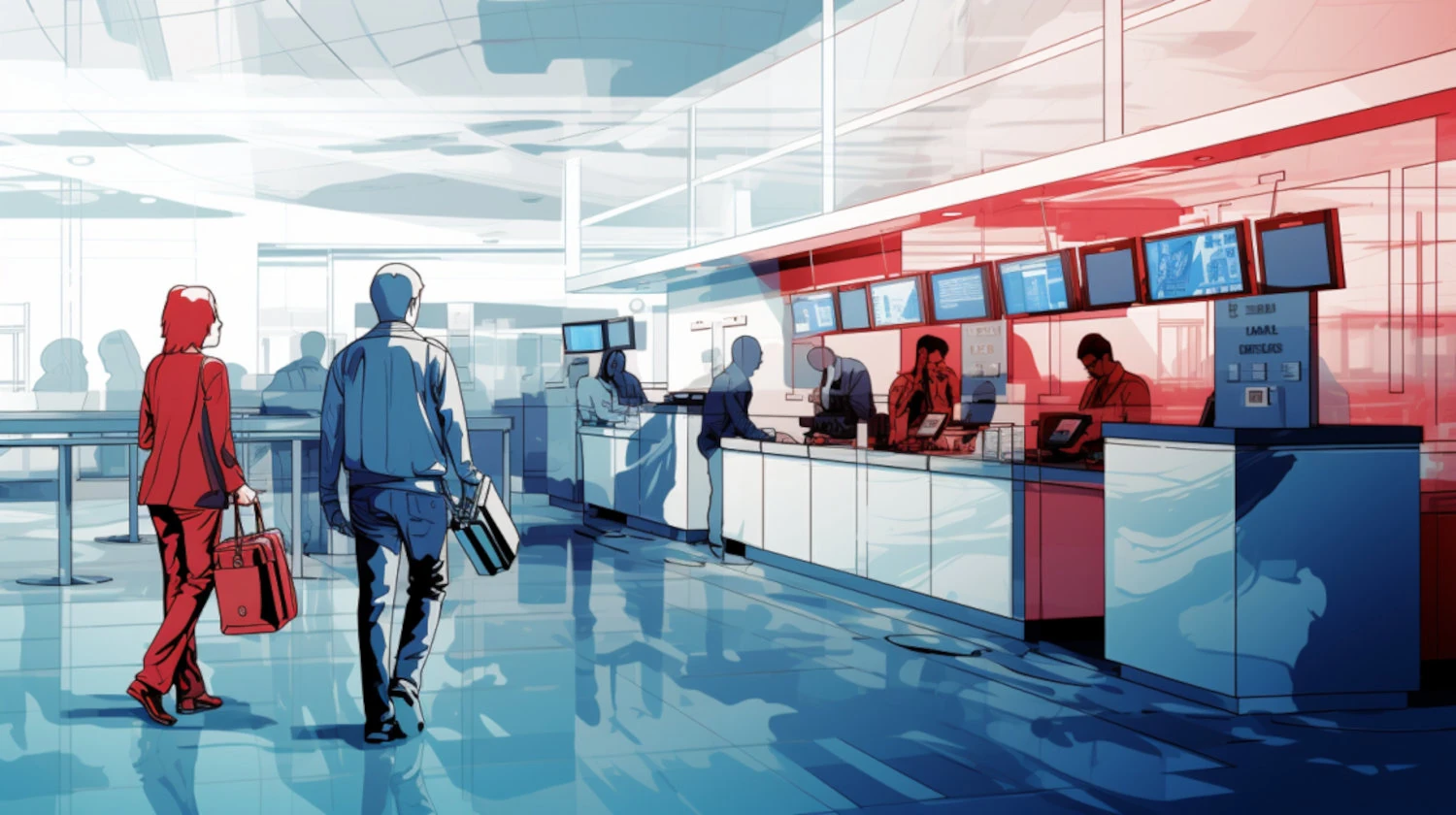In This Article
- Where in the US is CBD Legal?
- Are There Any States with Restrictions On CBD?
- What Differentiates CBD/Hemp from Marijuana to the Government?
- States That Prohibit CBD
- Is CBD Legal in Other Countries?
- Can You Fly with CBD?
- Can You Take CBD Oil On a Plane?
- Is It Legal to Fly With CBD Edibles?
- Can You Travel With CBD Gummies in the US?
- Can You Travel With CBD Gummies Internationally?
- Can I Bring a CBD Vape Pen on an Airplane?
- Can I Bring CBD Flower on a Plane?
- Can You Bring CBD Cream on a Plane?
- Can You Take CBD Tincture On a Plane?
- Can I Use Any CBD Products While on the Plane?
- References
CBD is generating some serious air miles, with millions of consumers worldwide benefiting from its painkilling and anxiety-relieving effects. Statista reveals that sales catapulted to $1.9 billion last year, but is this cannabinoid worthy of flying business class, or is turbulence on the horizon?
According to a Forbes Health survey of 2,000 U.S. adults, approximately 60% of American adults have at least tried CBD. CBD deserves all of the praise flying in its direction. It is thanks in large part to CBD — one of 113 identified cannabinoids — that the market is taking off so rapidly. By 2024, analysts foresee the CBD market launching from the runway at a velocity of $12 billion.
As much as 40% of the cannabis plant's extract belongs to CBD. Still, since it is also produced by a federally illegal plant that also produces intoxicating compounds like tetrahydrocannabinol (THC), many people wonder: Can I fly with CBD oil?
Whether you plan on departing from one U.S. state and landing in another or clocking up some air miles from the U.S. to Timbuktu, you must first understand if you can take CBD oil on a plane (as well as other products, such as edibles, vapes, and tinctures).
Fortunately, CBD is legal on the federal level if it contains less than 0.3% THC, which is why many people opt for CBD made from hemp when flying. Hemp is a variety of the Cannabis sativa plant species made legal in 2018.
Where in the US is CBD Legal?
Federal law stipulates that cannabis-derived CBD falls into the Schedule One substance category under the Controlled Substances Act. Conversely, hemp-derived CBD is federally legal in all 50 U.S. states.
Hemp's components were legalized in 2018 with the monumental passing of the USDA Farm Bill.
CBD only ticks the legal box if the THC content is 0.3% or lower on a dry weight basis. Moreover, CBD must not contain any other federally illegal controlled substances.
Are There Any States with Restrictions On CBD?
As per the National Conference of State Legislature (NCSL) website, 38 states, three territories, and the District of Columbia allow the medical use of cannabis products. Thanks to its therapeutic qualities, CBD is considered a medical cannabinoid, but since cannabis-derived CBD may contain fluctuating levels of the mind-altering substance THC, restrictions apply.
Fortunately, there is a way around it for CBD-seekers – opt for hemp-derived CBD. Idaho became the final state to legalize the crop in 2021, shading the entire U.S. map in a hazy shade of hemp. Although the production, transportation, and sale of industrial hemp are legal in 50 states, thus making hemp-extracted CBD legal, some states impose restrictions on what types of CBD products can be sold.
States with No Restrictions on CBD Sales
- Alabama
- Alaska
- Arizona
- Arkansas
- California
- Colorado
- Connecticut
- Delaware
- Florida
- Georgia
- Illinois
- Indiana
- Kentucky
- Maine
- Massachusetts
- Maryland
- Michigan
- Minnesota
- Mississippi
- Missouri
- Montana
- Nevada
- New Hampshire
- New Jersey
- New Mexico
- New York
- North Carolina
- North Dakota
- Ohio
- Oklahoma
- Oregon
- Rhode Island
- South Carolina
- South Dakota
- Tennessee
- Texas
- Vermont
- Virginia
- Washington
- West Virginia
- Wisconsin
- Wyoming
States with CBD Restrictions
The following states have some restrictions on the sale of CBD products:
What Differentiates CBD/Hemp from Marijuana to the Government?
The government focuses on whether or not the product contains THC in quantities high enough to induce intoxication. Typically, hemp does not produce more than 0.3% THC; therefore, it does not cause intoxication.
Despite being a subspecies of cannabis, hemp is federally legal. On the other hand, the average THC quantity in high-THC cannabis or "marijuana" — a federally illegal substance — rests at around 15% but can sometimes be higher.
Laboratory studies on cannabis samples from the DEA indicate that THC potencies are constantly climbing due to cross-breeding techniques and unregulated farming activities, rising from 9.75% in 2009 to 14.88% in 2018.1
Because of surges in THC concentration, consumers must be cautious of CBD sources (e.g., hemp or cannabis) and suppliers (e.g., licensed or legacy market).
States That Prohibit CBD
As of 2023, researchers are carrying out approximately 200 (or more) clinical trials into CBD. Just one CBD-based medication, Epidiolex, has received FDA approval so far for the treatment of childhood epilepsy.
Currently, all 50 U.S. states allow federally legal CBD. However, Idaho only allows hemp-derived CBD products that contain 0% THC and are extracted from plants that Idaho Code§ 37-2701 deems "Industrial hemp." Kansas also only allows the use of hemp for industrial purposes, not for human consumption. Hawaii, Iowa, Louisiana, Pennsylvania, and Utah do not allow smokable hemp or food-infused products. Hawaii, Iowa, Louisiana, and Pennsylvania laws also ban CBD in supplements.
Is CBD Legal in Other Countries?
The United Kingdom permits CBD if the THC content does not surpass 1 mg per container. According to the Court of Appeal, hemp flower with a THC content lower than 0.2% is not a narcotic drug. Legal CBD (containing 0.2% THC or less) production, sale, and use is also widespread across the European Union member states, with a few exceptions.
With a prescription or other requirements, Belize, the Caribbean, Panama, and Jamaica all welcome the use of medicinal CBD. Medicinal use has also been approved in Australia, New Zealand, South Africa, Israel, Colombia, Uruguay, Argentina, Brazil, Chile, Paraguay, and Peru, to name a few.
Countries around the world that strictly outlaw CBD include Hong Kong, Indonesia, Singapore, Vietnam, Cuba, El Salvador, Guatemala, Haiti, Nicaragua, Bolivia, Ecuador, Guyana, and Venezuela.
Can You Fly with CBD?
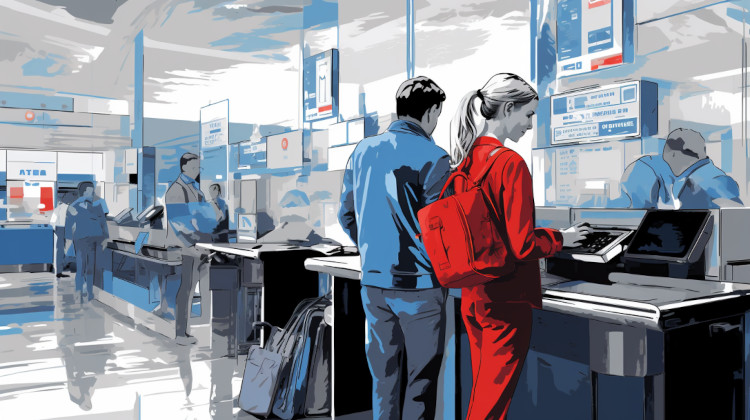
Airports and planes fall under federal jurisdiction, meaning passengers cannot travel with federally illegal items or substances. This includes cannabis. If it's hemp-derived, you'll be fine since hemp does not contain more than the legal limit of THC. That said, a handful of airports seem to be very relaxed regarding entering with THC, but certainly only some airports in some legal states.
For example, passengers traveling through Los Angeles International Airport (LAX) can carry a maximum of 28.5g of cannabis in line with California law. Flyers who are traveling within Oregon can also take THC-rich cannabis through Portland International Airport, and if you're flying via Seattle-Tacoma Airport, similar rules apply. Even still, all airspace is the domain of the federal government, so while you can bring high-THC cannabis into the airport, you still can't fly with it.
Before you start stuffing your favorite CBD products into your suitcase, you need to put yourself in the shoes of a TSA officer. Ask yourself if you could identify the CBD product's contents without having to pull its owner aside and conduct necessary sample testing procedures (and anything else necessary to rule out the possibility of an illegal substance like THC being transported from one state to another.)
Although the TSA permits travel with federally legal CBD, TSA agents may call law enforcement officers if they suspect any products have been tampered with or do not contain what is on the label. The easiest way to steer clear of unnecessary searches is to travel with the certificate of analysis (COA) and third-party lab reports since this will outline the product's exact contents. Clearly labeled and sealed CBD-containing packaging is essential, too.
Even passengers who travel via a permissive airport, or those who are headed in the direction of a place where cannabis is legal for both medical and recreational purposes, must feed their knowledge on federal and state laws regarding CBD and cannabis.
If the TSA agents find cannabis, they will most likely confiscate it, and you could either miss your flight or spend the evening (or possibly longer) in a jail cell; the outcome depends on the situation. TSA agents and law enforcement officers may also slap you with hefty fines and penalties, and there's a chance that you will face criminal charges.
The TSA implements special scanners to detect illegal narcotics like cannabis. These intelligent pieces of technology are designed to spotlight organic and inorganic materials. However, laboratory testing must be performed after suspicion-based confiscation since the scanning technology cannot distinguish hemp/CBD from THC.
Can You Take CBD Oil On a Plane?
The Transportation Security Administration (TSA) permits domestic traveling with CBD that contains 0.3% THC or less. Hemp-derived CBD must be in its original packaging with clear labeling. If in liquid form — e.g., creams, oils, and tinctures — the bottle should not exceed 3.4 ounces if stored in carry-on luggage but can be larger if transported in checked baggage. Rules apply to other products, too. CBD regulations differ between states and countries. For this reason, it's best to avoid traveling with CBD internationally.
Is It Legal to Fly With CBD Edibles?
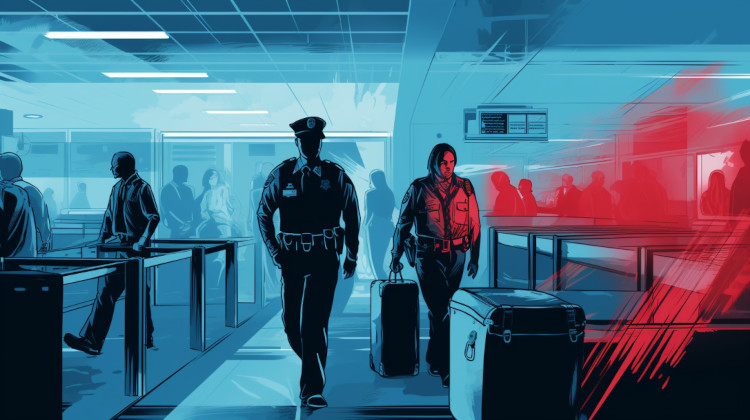
Before considering whether or not you'll get past the security checkpoint without being escorted in a pair of cuffs, it's a good idea to read up on the TSA's rules on flying with food. Traveling with perishables comes with its limitations.
If CBD-infused edibles are your preference in terms of medical cannabis product type, you're in luck. CBD products generally are permissible, so long as they feature proper labeling and packaging and do not exceed the THC threshold of 0.3%.
Keep in mind that these rules only apply when flying between U.S. states. If you plan on traveling outside the U.S. border, such as from LAX to Mexico or elsewhere like Thailand, the rules are more strict. No cannabis product, hemp-derived or not, can be taken outside the U.S.
Can You Travel With CBD Gummies in the US?
The TSA website states that travelers are welcome to fly domestically with CBD gummies in their carry-on bag and checked luggage, so long as the CBD contains less than 0.3% THC. Avoid delays at the security check-in counters by obtaining a certificate of analysis (COA) that clearly outlines the cannabinoid composition.
Gummies do not qualify as a liquid. Even soft gel capsules are considered a solid. Gummies made from THC-rich cannabis are not permitted on flights, even if the THC potency is low and the state you are disembarking from or flying to is a legal cannabis state. On that note, it goes without saying that CBD in any form, whether hemp- or cannabis-derived, must be left at home if you are jetting off to an international destination from the U.S.
Since some high-THC cannabis-derived CBD gummies may contain levels of THC exceeding the legal limit (0.3%), it's advisable to avoid packing those in your carry-on or checked luggage. Hemp is your hero in this case because the plant is federally legal in all 50 U.S. states and doesn't grow with more than 0.3% THC; therefore, any CBD sourced strictly from the hemp plant to produce gummies falls into the safe zone and is permissible on domestic flights.
Can You Travel With CBD Gummies Internationally?
When flying with medical CBD gummies, international flights are a no-go. If you have an urgent doctor's authorization, you may be able to bend the rules, though this is not guaranteed. CBD gummies are a type of edible product, and so the same edible regulations apply for domestic and international flights. Clear labeling is necessary; to prevent a search, ensure the package seals are still in place. Failure to abide by the rules means a potential prison stint, fines, and product confiscation.
Can I Bring a CBD Vape Pen on an Airplane?
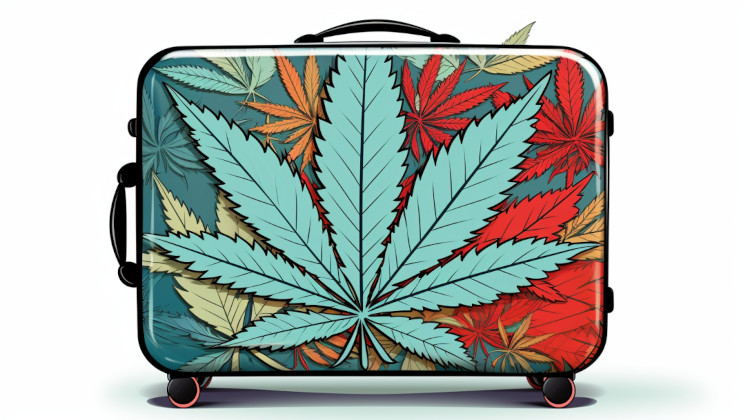
You won't have to leave your vape at home if you fly domestically between U.S. states. However, you must abide by the TSA's rules regarding electronic cigarettes and vaping devices, which clearly state that vape devices must be dismantled and strictly stored in carry-ons. E-juices are liquids and must not exceed 3.4 ounces but can be stored in carry-ons.
If the countdown is commencing for a vacation or work trip somewhere outside of the U.S. — A.K.A. an "international" flight — you may have to leave the vape at home. Once again, the TSA's rules apply, as do the laws of the country you plan on visiting. Numerous countries forbid vaping devices, including:
- Brazil
- Cambodia
- India
- Lebanon
- Nicaragua
- Singapore
- Thailand
Disobeying the rules and getting caught with a vape in your luggage may result in fines. Plus, passengers contemplating vaping CBD on an airplane must consider the safety aspect; one passenger's negligent behavior may affect every person's safety on board the flight.
Can I Bring CBD Flower on a Plane?
In line with the TSA website's medical marijuana information, low-THC cannabis, whether in flower form or extract, is permissible on domestic flights. Curb the THC content at 0.3%, and you're good to go but don't try your luck internationally. Medicinal-grade CBD flower products are permissible in carry-ons and checked bags.
Can You Bring CBD Cream on a Plane?
CBD creams are liquids. Per the TSA's liquids rule, creams, gels, and pastes go inside the carry-on if they are 3.4 ounces or less. You will need to pack anything larger in checked baggage. Hemp-derived CBD is permissible on domestic flights if it meets the liquid requirements and is appropriately packaged/labeled, but it is still not permissible on international flights.
Can You Take CBD Tincture On a Plane?
CBD tinctures are convenient, discreet, and can be used on the move for accurate dosing. Don't expect to use yours on the move if it contains THC levels over the federal limit of 0.3%, however. Nor should you expect to use it in any form of international travel.
Simply put, CBD is CBD, regardless of how you use it. Tinctures are liquid, so you must pack these CBD products under the TSA liquid rules. They are welcome on domestic flights if hemp-derived and produced as per the Farm Bill. They can be stored in checked luggage or carry-ons.
Can I Use Any CBD Products While on the Plane?
Smoking on board always has been and always will be an illegal offense, so if you prefer smoking CBD, you'll have to wait until you land in a CBD- and smoking-friendly zone. On-flight smoking bans have been imposed under the Department of Transportation since 2000. Vaping CBD, nicotine, or any other type of "e-juice" is also forbidden. All passengers must conceal their dismantled vaporizer device (with batteries removed) inside carry-ons, not checked luggage.
On the plus side, numerous CBD products are usable mid-flight when traveling via a domestic route and carrier. CBD topicals that you can slather over a small portion of your skin without making a mess on the plane, CBD-infused capsules or supplements that you can swallow with a drink you purchase onboard or from a bottle that meets the volume requirements set out under the TSA rules, shouldn't be a problem either.
Even if traveling with a suitable CBD product, you should refrain from fiddling with your belongings during take-off or landing; the flight attendants will instruct you to buckle up and close all overhead bag storage bins. International flights or foreign carriers strictly outlaw the use of federally illegal substances onboard.
References
- ElSohly MA, Chandra S, Radwan M, Majumdar CG, Church JC. A Comprehensive Review of Cannabis Potency in the United States in the Last Decade. Biological Psychiatry: Cognitive Neuroscience and Neuroimaging. 2021;6(6):603-606. doi:https://doi.org/10.1016/j.bpsc.2020.12.016
↩︎
The information in this article and any included images or charts are for educational purposes only. This information is neither a substitute for, nor does it replace, professional legal advice or medical advice, diagnosis, or treatment. If you have any concerns or questions about laws, regulations, or your health, you should always consult with an attorney, physician or other licensed professional.

